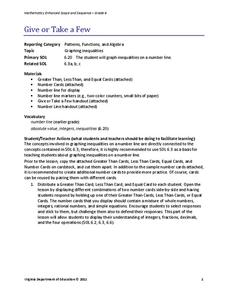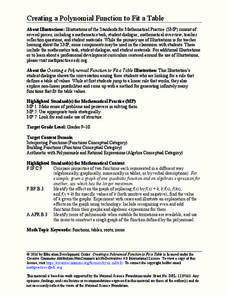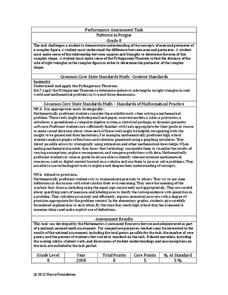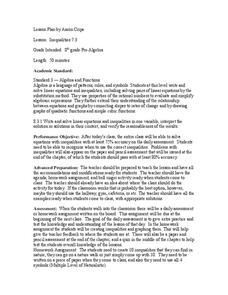Curated OER
You Can Count on Squares!
Fourth graders engage in and explore to develop mathematical, specifically algebraic, ideas. Although the tasks are built around measurement, they are algebraic to the extent that they require 'formulae' to be derived form the geometric...
Curated OER
Can Stack
Learners are able to find the rule for summing consecutive numbers;
identify the pattern of triangular numbers. They then solve the given problem using logic and mathematical reasoning.
Pennsylvania Department of Education
Alike and Different
Students compare and contrast objects and are introduced to a Venn Diagram. In this alike and different lesson, students make observations regarding properties of objects. Students classify object and build ideas about variables....
Curated OER
Pepe Cleaners
Seventh graders gather data to determine the relationships between the base and height of rectangles with fixed perimeters and express the relationships using words and symbols. Students build rectangles with pipe cleaners. They create...
Curated OER
Cups and Cubes
Third graders explore the use of cups and counters as a model to analyze the effects of operations. They create and use a rule to create a sequential pattern and use cups and cubes to model the relationship.
Curated OER
You Gotta Have Heart
Ninth graders investigate the concept of relations and interpret graphs and tables. They analyze given data and look for a pattern to determine if the numbers represent a function. Students practice solving scientific word problems that...
Curated OER
Pizza Toppings 2
Students explore possible combinations of items. They devise and use problem solving strategies to explore situations mathematically. They examine using linear and quadratic patterns to solve combination problems. From a given...
Curated OER
Rational Exponents
Investigate rational exponents in this math lesson. Scholars make conjectures about the relationship between rational exponents and radicals. They then use their Ti-Nspire to simplify rational exponents.
Mathalicious
Three Shots
To foul or not to foul, that is the basketball question. High schoolers look at the probability that fouling out a player and allowing free throws yields a better outcome than allowing the original shot. The resource provides a teacher's...
Inside Mathematics
Conference Tables
Pupils analyze a pattern of conference tables to determine the number of tables needed and the number of people that can be seated for a given size. Individuals develop general formulas for the two growing number patterns and use them to...
Virginia Department of Education
Give or Take a Few
Young mathematicians extend their knowledge of rational numbers on a number line to graph inequalities by first using number cards to compare rational numbers. They finish by using similar reasoning to graph inequalities on a number line.
Education Development Center
Creating a Polynomial Function to Fit a Table
Discover relationships between linear and nonlinear functions. Initially, a set of data seems linear, but upon further exploration, pupils realize the data can model an infinite number of functions. Scholars use multiple representations...
Inside Mathematics
Patterns in Prague
Designers in Prague are not diagonally challenged. The mini-assessment provides a complex pattern made from blocks. Individuals use the pattern to find the area and perimeter of the design. To find the perimeter, they use the Pythagorean...
Inside Mathematics
Rugs
The class braids irrational numbers, Pythagoras, and perimeter together. The mini-assessment requires scholars to use irrational numbers and the Pythagorean Theorem to find perimeters of rugs. The rugs are rectangular, triangular,...
Pennsylvania Department of Education
Extending Pattern Understandings
Young scholars use shapes and manipulatives to demonstrate patterns. In this patterns lesson plan, students also break up patterns to identify a pattern unit.
Alabama Learning Exchange
Battle to the Death: Adding Integers
Young scholars explore the concept of adding integers. In this adding integers lesson, young scholars simulate the battle of the 300 spartans at Thermopylae. Young scholars use colored game pieces to represent positive and negative...
Curated OER
Inequalities and The Order of Operations
Middle and high schoolers investigate how to solve inequalities. The lesson has a good guide for taking pupils through a direct instruction of the concept. You can use counting tiles in order to help kinesthetic learners.
Curated OER
Inequalities 7.3
Graph inequalities and discuss the difference in their slopes. Learners observe rate of change as they compare linear, quadratic, and cubic functions.
Curated OER
Properties of Equality
What assumptions are made in order to solve equations? An instructional slideshow provides an overview and guided examples of how properties of equality can be used to justify each step in solving equations.
Virginia Department of Education
Scientifically Speaking
Explore the connection between operations with scientific notation and the laws of exponents. Scholars work on a set of word problems involving operations with scientific notation. Along the way, they consider how the laws of exponents...
Utah Education Network (UEN)
Linear Relationships: Tables, Equations, and Graphs
Pupils explore the concept of linear relationships. They discuss real-world examples of independent and dependent relationships. In addition, they use tables, graphs, and equations to represent linear relationships. They also use ordered...
Curated OER
Simplify Radicals
Learners are introduced to the concept of radicals and how to use them in various situations. They review rational and irrational numbers while simplifying different number sentences. They also practice factoring perfect squares.
Curated OER
Introduction to Statistics: Mean, Median, and Mode
Learners explore the concepts of mean, median, and mode. They develop an understanding and familiarity with these concepts. Students explore mean and median in an efficient way. Learners explore three different measures of center.
Curated OER
The Integration of Exponential Functions
In this calculus learning exercise, students solve problems using integration. They solve exponential functions using differentiation formulas. There are 12 problems with an answer key.

























